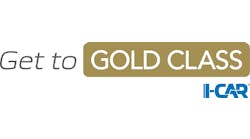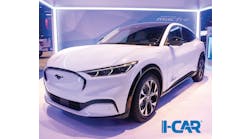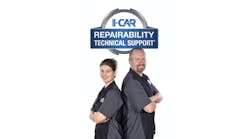Few repairs are more important than the ones that hold your car together. As metals and alloys continue to evolve, I-CAR is committed to keeping your shop’s technicians as mechanically proficient, structurally knowledgeable and all-around savvy as can be. Whatever rolls through your shop doors, your technicians will have the knowledge and know-how to put it back together. And that means welding.
“Welding is critical,” says Elisabeth Sobczak, Manager of Field Support Services and Quality at I-CAR, “and there’s no option for failure. It’s powerful to have hands-on, in-the-trenches real-life experience. That’s what I-CAR’s new courses offer the industry.”
As part of I-CAR’s curriculum overhaul and Even Better training options, welding and its hands-on skills assessment components are front and center for the entire program.
Sobczak knows that hands-on training—in technicians’ own shops, on their own time and in their own environment—is the crux of training that leads to lasting learning. As part of its total curriculum overhaul, I-CAR is bringing its industry-leading training where it matters most: into the shop, directly into the hands (and minds) of its most ardent and ambitious technicians.
“These courses are built on a conversation first, and then the activity,” Sobczak says.
“Then a conversation about the next step, then the activity. You’re not jumping right into the ‘do,’ or the activity. We’re actively thinking about all the scenarios in the shop that could occur, and that’s where the facilitation comes in. It makes people more proactive and enjoy what they’re doing as they’re learning.”
Deeper Learning for Better Welds and Repairs
It’s not just beneficial for the technicians—it’s beneficial for the instructors and the managers to train in the shop, as well. Sobczak says she watched as I-CAR’s own instructors grew due to the more proactive, face-to-face way of teaching.
“It’s a much deeper-level learning,” she says, “this is what the industry asked and if you are open to developing your skill sets, regardless of tenure in the industry, these hands-on courses will help you accomplish that goal. Technicians and managers alike loved the pilot courses, and the energy could not be higher among I-CAR instructors and assessors.”
“Elisabeth nailed it,” says Pete Lais, Principal Product Manager at I-CAR.
“The welding and hands-on courses are special. You’re working in your own shop on your own equipment. The I-CAR instructor is a facilitator, and that camaraderie is built through the instructor and eventually through your classmates and teammates. You see the ‘aha’ moment, and it makes the learning experience enjoyable.”
Because incomplete and incorrect welds can lead to faulty structural integrity, occupant safety is compromised the minute a bad weld leaves the shop floor. The sheer volume of contemporary mixed materials, coupled with new vehicle technologies, requires an increased commitment to welding training and certification.
To address this, I-CAR will soon require certification renewals every three years, instead of five.
Lais says I-CAR is adding more skills-based courses for three primary reasons:
-
To enable options recommended or suggested by industry advising councils and shops to accurately repair modern vehicles
-
To empower technicians to learn at their own shop on their own equipment
-
To answer what the industry has demanded for years—hands-on training in real-life situations (i.e., the actual shop)
Sobczak agrees that three-year certifications aren’t only more beneficial to shops and the customers they serve—it’s a proactive and preemptive move to keep up with the Technical Tsunami™ sweeping the repair industry.
“A five-year test is too long between certifications, especially when you are talking about one of the most important parts of the repair. Not everyone welds every day and bad habits can form,” she says, “and some OEs even recommend two-year certifications. It’s about striking a balance to revisit skill sets and the ever-changing technology.”
Empowering Technicians with Choices
I-CAR isn’t concerned with only granting agency to shop owners; they want to empower every technician as part of the Even Better I-CAR program, whether they weld aluminum, steel or both.
“We are enabling our welding technicians and the training managers within the shop with choice,” Lais says.
“We’re going to introduce three new recertification courses and include only the test portion of what one would receive in our traditional welding and recertification course. It’s for confident welders with a current welding certification. We will continue to offer the traditional course where we test after the instruction, training, and practice.”
“We anticipate it’s going to make a big impact,” Sobczak agrees.
“Experienced, proficient welders will probably do very well in the recertification course (test-only), and those who prefer assistance will probably lean toward the traditional course; both courses are considered in-shop. Again, we want to provide training in an environment familiar to the student.
More than anything, the new courses represent a continued commitment to innovation from I-CAR on behalf of the industry. Both inexperienced and seasoned veterans will benefit from the new training curriculum because of how it’s tailored to meet the needs of every individual, depending upon their skill set, comfort level and ambition.
“We’re getting to the how quicker—that is the actual hands-on. The why is important too and is the prerequisite for the how,” Lais says.
“We’re raising awareness of the daily shop challenges and bringing consistency. Skill-set differences are bridged within the shop when everyone is learning together.”
“This process brings teamwork to the forefront,” Sobczak says.
“You’re putting students in the real-world environment in their own shop opposed to a simulation. They’re utilizing their tools, their equipment.”
To learn more about how I-CAR’s Even Better training can help prepare you for the future, click here.




